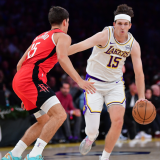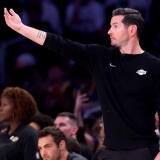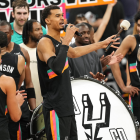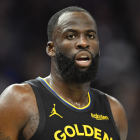The Warriors might be down now, but doubting them is a foolish deed
Golden State isn't rolling right now but a groove is coming, and soon

The Oklahoma City Thunder have taken control of the Western Conference finals with a 2-1 series lead, humbled a 73-win Warriors squad, demonstrated that stars who travel in packs can beat anyone, that bigs and old-school iso basketball can still beat this fancy-small-ball-three-point-shooting craze, and that Steph Curry and his cohorts are vulnerable.
The Thunder, we've seen and been told, are well on their way to besting the Warriors and giving Kevin Durant and Russell Westbrook another crack at an NBA championship.
So the narrative says.
Here's the thing: The narrative's wrong.
The Warriors are going to win this series.
There are a lot of reasons this is true, starting with the fact the Warriors always play better when they're doubted and down. They are 12-0 this season after a loss. They were crafted by doubt -- Curry always overlooked, Draymond Green a second-round pick, Klay Thompson drafted 11th overall. Even as they entered this season as defending champions, the league's talking heads and general managers and even Las Vegas oddsmakers believe they were far from favorites to repeat. Doubt defines this team.
In the last two seasons, the Warriors are 1-6 in Game 3s. Hasn't mattered. They are just a single win from reclaiming home-court advantage -- and being in the same position as the Cleveland Cavaliers. Despite Toronto's win Monday night, do you really believe LeBron won't advance to another NBA Finals?
And yet we're writing off Steph and his guys.
Which is just where the Warriors want to be.
Last year, Golden State was down 2-1 against both the Grizzlies and the Cavaliers. Then, the magic. Yes, yes, I know -- the Grizzlies aren't this Thunder team, and the Cavs were injury-depleted. But what makes the Warriors great isn't about who they play -- it's about them. They always believe. Truly. Being down, in a game or a fourth quarter or a series, is just a longer step for them to the inevitable win, to greatness, to shoving all that doubt in the world's face, one three-point shot at a time.
It really can be boiled down to this: The Warriors are one of the NBA's best-ever teams, Curry is playing better than anyone on Earth and this team and Curry's greatness can swat away a 2-1 series deficit and all those doubters with the flick of a three-point-shooting wrist. And they will.
That's why they haven't veered, as this series has to the outside world seemed to have gotten out of control, from what they do or who they are.
The conventional wisdom arguing against this is that the Warriors have panicked under the strain of the Thunder's great defense and athleticism, and so have stopped playing Warriors basketball. The view out there is that one consequence of this is they haven't passed enough -- that they've turned to three-point shots minus the ball movement that made it work and have therefore been exposed.
That's just wrong.
In the regular season, the Warriors were seventh in passes per game with 323.1. They've topped that in the postseason, averaging 336. 2 passes per game. After three games in both conference finals series, they're out-passing (334 passes per game) by a wide margin the three remaining playoff teams: the Raptors (287.3), Cavs (268.7) and Thunder (242.7).
Why does this matter? Because the Warriors haven't stopped playing Warriors basketball. It just hasn't, over a very small three-game sample size, worked as well. But again -- this team has not lost back-to-back games all season long.
Let's compare the Warriors' regular-season trends with what they've done in this series against the Thunder:
Three-point shots per game
Regular season: 31.6 (1st in the league)
Conference finals: 30.3
Conclusion: They're clearly shooting just as many threes, obviously a major component of their game. They haven't changed.
Three-point field-goal percentage
Regular season: 41.6 percent (1st)
Conference finals: 37.4 percent
Conclusion: While 37.4 percent is still strong, it's a significant drop over three games for a team that was extraordinary at it over 82 games (and then much of this postseason). Also known as: a statistical anomaly.
Field-goal shooting
Regular season: 48.7 percent (1st)
Conference finals: 45.1 percent
Conclusion: That drop would have made them 15th in the regular season. Again, shots that normally fall haven't so far this series. That will change.
Assists per game
Regular season: 29.1 (1st)
Conference finals: 23.7
Conclusion: The Warriors' ball movement (those passes we mentioned earlier) usually leads to buckets. But because they're missing shots, their assists are down. As noted, they're actually passing more often per game.
In other areas -- turnovers per game, turnover percentage, rebounds per game, etc. -- the Warriors are on par with what they've tended to do since becoming champions. The big hurt comes here:
Offensive rating
Regular season: 114.5 (1st)
Conference finals: 106.3
Conclusion: This would've been 13th, just below league average. They've gone from a great offensive team to a mediocre one. Or ... it's just three games.
Defensive rating
Regular season: 103.8 (5th)
Conference finals: 107.3
Conclusion: This would've been 18th, well below the league average. Again, they've regressed -- or the Thunder have made them regress -- at one of their great strengths.
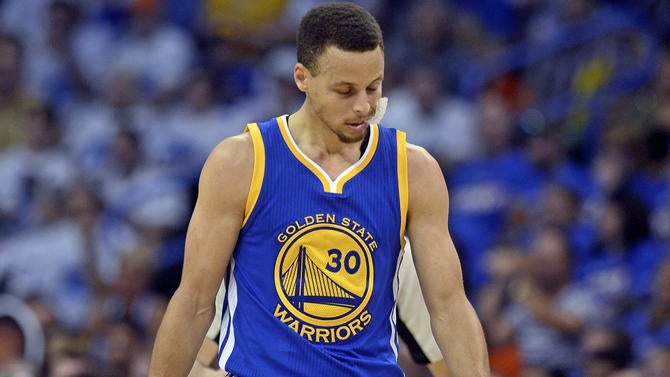
That means the Warriors have scored 8.2 fewer points per 100 possessions against the Thunder in this series than they did throughout the regular season. They're giving up 3.5 more points per 100 possessions in this series vs. throughout the regular season. That's a swing of almost 12 points per 100 possessions. That's a ton.
Interestingly, the Thunder's defensive rating in the regular season was 105.6, good for a middling 13th in the league. In these playoffs it's 102.9, which would've been third in the regular season.
So the question is: Do you buy that it is the Thunder's defense being legit, rather than the Warriors' offense not clicking through three games, that is the difference maker? And do you believe that over the course of the remaining series, as the pressure tightens and legacies and rings hang in the balance, that the Thunder's defense will win out over the Warriors' offense?
I don't believe it. Not for a minute. Even though, yes, OKC had been getting better defensively heading into the playoffs.
I believe the Warriors aren't making buckets like they're used to. I believe that'll change, starting in Game 4. I believe that what we saw with the Warriors this year -- the records, the greatness, the magic -- is real and has not faded because of three games.
Already, we've seen some weakness in the Thunder's defense, some signs that the floodgates could soon open up. In this series Oklahoma City's defensive rating is 106.3, which is right back on par with being mediocre.
The Warriors can score on these guys. They just need to make the shots they usually do, and play the kind of defense that made them champions in the first place.
And they will.
They have not given up on who they are. They got a huge break from the league when Draymond Green was not suspended for kicking Steven Adams in the groin. And time and history -- including a championship, our first unanimous Most Valuable Player award, a record-setting 73 wins -- have shown us that the tide is likely soon to turn.
Almost no one agrees with me on this. It is easy to forget how good this team is, when the moment tries to tell us otherwise.
But one place -- and a place trained in taking money by seeing what others don't -- also has the Warriors winning this series, and then the next one: Las Vegas.
Before Green was cleared for Game 3, Vegas released its odds. It had the Warriors as the clear favorites to win it all at 13-to-10. And It liked them, against the Thunder, at 1.35-to-1.
Why?
Because the Warriors being down one game is a statistical blip on the radar. And their willingness to stay true to what and who they are means they will soon enough remind all of us, again: Doubt them at your own foolishness.




